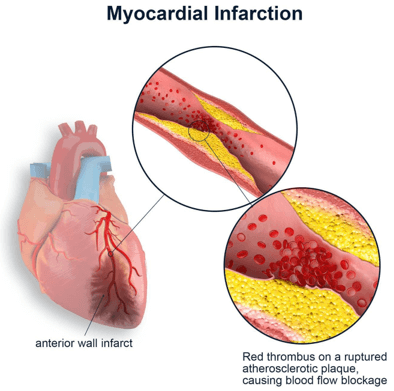The practical nurse (PN) is caring for a client with coronary artery disease who is admitted with intermittent chest pain. The admission laboratory results indicate elevations in troponin I and creatine phosphokinase myoglobin isoenzyme (CK-MB) levels.
What should the PN consider the most significant risk for this client on the second day of admission?
The lab results indicate myocardial damage, and the client is at risk for cardiac dysrhythmias
The client is at risk for pulmonary embolism, and lifestyle modifications need to be implemented.
The client is at risk for recurrent long-term angina pain and subsequent myocardial infarction (MI).
The lab results indicate risk factors for transient ischemic atack (TIA), and neurological vital signs should be monitored.
The Correct Answer is A
Troponin I and CK-MB are cardiac enzymes that are released into the bloodstream when the heart muscle is injured or necrotic. Elevated levels of these enzymes indicate that the client has suffered a myocardial infarction (MI) or heart atack. The damaged heart tissue can impair the electrical conduction system of the heart and cause abnormal heart rhythms or dysrhythmias, which can be life-threatening. The PN should monitor the client's cardiac status closely and report any changes to the charge nurse.
The other options are not correct because:
- The client is not at risk for pulmonary embolism, which is a blockage of a pulmonary artery by a blood clot or other material. Pulmonary embolism does not cause elevated cardiac enzymes, but it can cause chest pain, shortness of breath, and hypoxia.
- The client is not at risk for recurrent long-term angina pain, which is chest pain caused by reduced blood flow to the heart muscle due to narrowed or blocked coronary arteries. Angina pain does not cause elevated cardiac enzymes, but it can be a warning sign of an impending MI.
- The lab results do not indicate risk factors for transient ischemic atack (TIA), which is a temporary interruption of blood flow to a part of the brain due to a clot or plaque. TIA does not cause elevated cardiac enzymes, but it can cause neurological symptoms such as weakness, numbness, or speech difficulties.

Nursing Test Bank
Naxlex Comprehensive Predictor Exams
Related Questions
Correct Answer is A
Explanation
This statement indicates that the client has reached a level of acceptance of his prognosis, as he expresses a sense of peace, gratitude, and hope. He has found sources of strength and comfort from his faith and family, and he does not show signs of denial, anger, bargaining, or depression.
The other options are not correct because:
B . This statement indicates that the client is in the stage of rationalization, as he tries to justify or minimize his condition by stating a fact that does not address his feelings or needs.
C. This statement indicates that the client is in the stage of anger, as he shows resentment and hostility towards those who challenge his optimism or reality.
D. This statement indicates that the client is in the stage of blame, as he implies that his condition could have been prevented or treated if the doctor had diagnosed it earlier.
Correct Answer is C
Explanation
A) Incorrect - Requesting the client to lie still may be relevant for certain assessments, but it is not specific to the situation described in the question.
B) Incorrect - Inquiring about episodes of sundowning is more relevant for clients with cognitive impairment and is not directly related to the client's weight loss and decreased energy and appetite.
C) Correct - Questioning the client about the frequency of falls is important, as falls can contribute to weight loss, decreased energy, and appetite changes in older adults.
D) Incorrect - Assisting the client with clarifying values about end-of-life care is a valuable nursing intervention but is not the priority in this assessment scenario.
Whether you are a student looking to ace your exams or a practicing nurse seeking to enhance your expertise , our nursing education contents will empower you with the confidence and competence to make a difference in the lives of patients and become a respected leader in the healthcare field.
Visit Naxlex, invest in your future and unlock endless possibilities with our unparalleled nursing education contents today
Report Wrong Answer on the Current Question
Do you disagree with the answer? If yes, what is your expected answer? Explain.
Kindly be descriptive with the issue you are facing.
